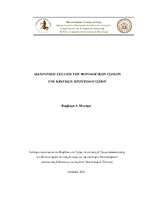| dc.contributor.advisor | Στρόμπλος, Νικόλαος | |
| dc.contributor.author | Μανάρα, Βαρβάρα | |
| dc.date.accessioned | 2024-04-02T11:51:45Z | |
| dc.date.available | 2024-04-02T11:51:45Z | |
| dc.date.issued | 2024-03-05 | |
| dc.identifier.uri | https://polynoe.lib.uniwa.gr/xmlui/handle/11400/6339 | |
| dc.identifier.uri | http://dx.doi.org/10.26265/polynoe-6175 | |
| dc.description.abstract | Η οικονομική κρίση, η υγειονομική κρίση και γενικά τα δημοσιονομικά προβλήματα που αντιμετώπισε η Ελλάδα τα τελευταία χρόνια οδήγησαν σε συνεχείς φορολογικές μεταρρυθμίσεις με στόχο την αύξηση των φορολογικών εσόδων, τα οποία είναι η κύρια πηγή χρηματοδότησης των αναγκών του κράτους. Στην παρούσα εργασία εξετάστηκε η εξέλιξη των φορολογικών εσόδων της Ελλάδας σε επίπεδο χώρας και σε σύγκριση με τα φορολογικά έσοδα των υπόλοιπων χωρών της Ευρωπαϊκής Ένωσης (ΕΕ) και του Οργανισμού Οικονομικής Συνεργασίας και Ανάπτυξης (ΟΟΣΑ) καθώς και η επίδρασή τους στους φορολογούμενους και την οικονομική δραστηριότητα της χώρας. Διαπιστώθηκε ότι η υψηλή φορολόγηση που επιβλήθηκε στους φορολογούμενους οδήγησε από την μία πλευρά σε αύξηση των φορολογικών εσόδων και από την άλλη πλευρά στην εξάντληση της φοροδοτικής ικανότητας των πολιτών και κατά συνέπεια στη μείωση της κοινωνικής τους ευημερίας καθώς και στον περιορισμό της οικονομικής ανάπτυξης της χώρας και την εξασθένιση των κινήτρων για επενδύσεις. Επομένως, είναι επιτακτική η ανάγκη λήψης μέτρων φορολογικής πολιτικής με σκοπό την προώθηση της ανάπτυξης της ελληνικής οικονομίας και την παροχή κινήτρων για επενδύσεις καθώς και την άμβλυνση των κοινωνικοοικονομικών ανισοτήτων και τη βελτίωση του βιοτικού επιπέδου των πολιτών. | el |
| dc.format.extent | 121 | el |
| dc.language.iso | el | el |
| dc.publisher | Πανεπιστήμιο Δυτικής Αττικής | el |
| dc.rights | Αναφορά Δημιουργού - Μη Εμπορική Χρήση - Παρόμοια Διανομή 4.0 Διεθνές | * |
| dc.rights.uri | https://creativecommons.org/licenses/by-nc-sa/4.0/deed.el | * |
| dc.subject | Φορολογία | el |
| dc.subject | Φόροι | el |
| dc.subject | Φορολογικά έσοδα | el |
| dc.subject | Φορολογική πολιτική | el |
| dc.subject | Φορολογικοί συντελεστές | el |
| dc.subject | Φορολογικά συστήματα | el |
| dc.subject | Οικονομική ανάπτυξη | el |
| dc.title | Διαχρονική εξέλιξη των φορολογικών εσόδων του κρατικού προϋπολογισμού | el |
| dc.title.alternative | Evolution of tax revenues over time of the state budget | el |
| dc.type | Μεταπτυχιακή διπλωματική εργασία | el |
| dc.contributor.committee | Πανάγου, Βασίλειος | |
| dc.contributor.committee | Αλεξόπουλος, Ανδρέας | |
| dc.contributor.faculty | Σχολή Διοικητικών, Οικονομικών & Κοινωνικών Επιστημών | el |
| dc.contributor.department | Τμήμα Λογιστικής και Χρηματοοικονομικής | el |
| dc.contributor.master | Δημόσια Οικονομική και Πολιτική | el |
| dc.description.abstracttranslated | The economic crisis, the health crisis and the fiscal problems in general that Greece faced in recent years have led to continuous tax reforms with the aim of increasing tax revenues, which are the main source of financing the needs of the state. In this study were examined the evolution of Greece's tax revenues at the country level and in comparison with the tax revenues of the other countries of the European Union (EU) and the Organization for Economic Cooperation and Development (OECD) as well as their effect on the taxpayers and economic activity of the country. It was found that the high taxation imposed on taxpayers led on the one hand to an increase of tax revenues and on the other hand to the exhaustion of the taxing capacity of the citizens and consequently to the reduction of their social welfare as well as to the limitation of economic growth of Greece and the weakening of incentives to investments. Therefore, it is imperative to take tax policy measures with the aim of promoting the economic growth of Greece and providing incentives for investment as well as mitigating socio-economic inequalities and improving the standard of living of citizens. | el |


